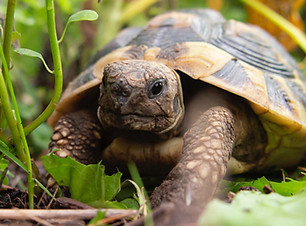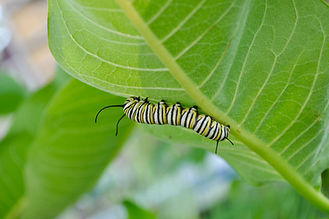
Every Garden Helps
Every garden makes a difference. Here are some of the ways yours will help.

Save Water
The U.S. has about 40.5 million acres of lawn, an area larger than the state of Iowa! It takes 20 trillion gallons of water per year to water this (in contrast we use just 30 trillion gallons to irrigate all our crops), and we use mostly drinking water.
Over-pumping of this groundwater is not only depleting U.S. aquifers but also causing cities up and down the east coast to sink as soil compacts, with several hotspots in Maryland sinking over 10 centimeters per decade.
Native plants that are properly suited to the area where they are planted will require very little water after they are established. You can make a difference by transitioning to low water and drought resistant plants.

Protect Wildlife
Turf lawns do not offer substantive food or habitat for wildlife. Native flowers provide critical nectar and seeds for birds, hummingbirds, butterflies, skippers, and bees. While bird feeders can provide critical nourishment when natural food sources are absent, natural sources of nectar and seeds have a decreased risk of spreading illness among birds.
In addition to providing food, these gardens also provide habitat. Bees overwinter in plant stalks. Box turtles overwinter and lay their eggs in soil, which is not accessible in a yard that is only lawn and mulch. Native ground covers can replace mulch, making the ground accessible to these creatures, preserving biodiversity and pollination needed for our food supply.
Unlike lawns, these gardens need no chemicals. You can help wildlife thrive by not allowing spraying at your home.
_%20I%20took%20this%20p.png)
Clean Air & Rivers
Native gardens improve the quality of surrounding water, with no fertilizer or pesticides needed, so less ending up in run-off that goes into the water where our children and dogs swim. Not only do most native plants thrive in poor soil, but many will even flop over if fertilized. Over-fertilization is the leading cause of the decline and degradation of the Chesapeake Bay and tributaries. Native plants don't require pesticides because they are naturally resilient to local pests.
These gardens can be designed to catch rainwater. This slows runoff after a storm, allowing water to be filtered through the ground, purified, and cooled, before reaching a river or other water source.
Native and pollinator gardens improve air quality by eliminating the need for mowers and other equipment, and sequestering pollutants from the atmosphere.


Support Monarchs
Monarch butterflies are threatened by pesticides and habitat loss, with populations declining by over 80% in past decades. By planting milkweed (the only plant monarch caterpillars can eat) and flowers that offer nectar including to feed migrating monarchs in late summer, you can help protect these creatures. You can also help by now allowing spraying of chemicals on your property, and not purchasing plants that have been treated with systemic insecticides. Both insecticides and herbicides can be harmful to monarchs. Herbicides can reduce floral resources and host plants. Most insecticides have the potential to poison or kill monarchs and other pollinators. Systemic insecticides, still found widely in farm and garden products, are particularly problematic because the chemicals become distributed throughout all plant tissues, including the leaves and nectar, and poison pollinators feeding on leaves or nectar.

Further Reading
-
Dubner, Stephen J. (2017, May 31). How Stupid Is Our Obsession With Lawns? Freakonomics podcast. https://freakonomics.com/podcast/how-stupid-is-our-obsession-with-lawns/
-
Rojanasakul, M., & Hernandez, M. (2024, February 23). From NYC to Miami, Major Cities Along the East Coast are Sinking. The New York Times. https://www.nytimes.com/interactive/2024/02/13/climate/flooding-sea-levels-groundwater.html
-
Rojanasakul, M., Flavelle, C., Migliozzi, B., & Murray, E. (2023, December 29). America is draining its groundwater like there’s no tomorrow. The New York Times. https://www.nytimes.com/interactive/2023/08/28/climate/groundwater-drying-climate-change.html
-
Monarchs in decline. (2024, February 7). Xerces Society. https://xerces.org/monarchs/conservation-efforts
-
Xerces Society. (2019). Monarch nectar plants: Mid-Atlantic [Report]. https://xerces.org/sites/default/files/2018-05/16-042_01_XercesSoc_MonarchNectarPlants_Mid-Atlantic_web-3page_0.pdf
-
Chesapeake Bay. (n.d.). Department of the Environment. https://mde.maryland.gov/programs/water/TMDL/TMDLImplementation/Pages/overview.aspx
